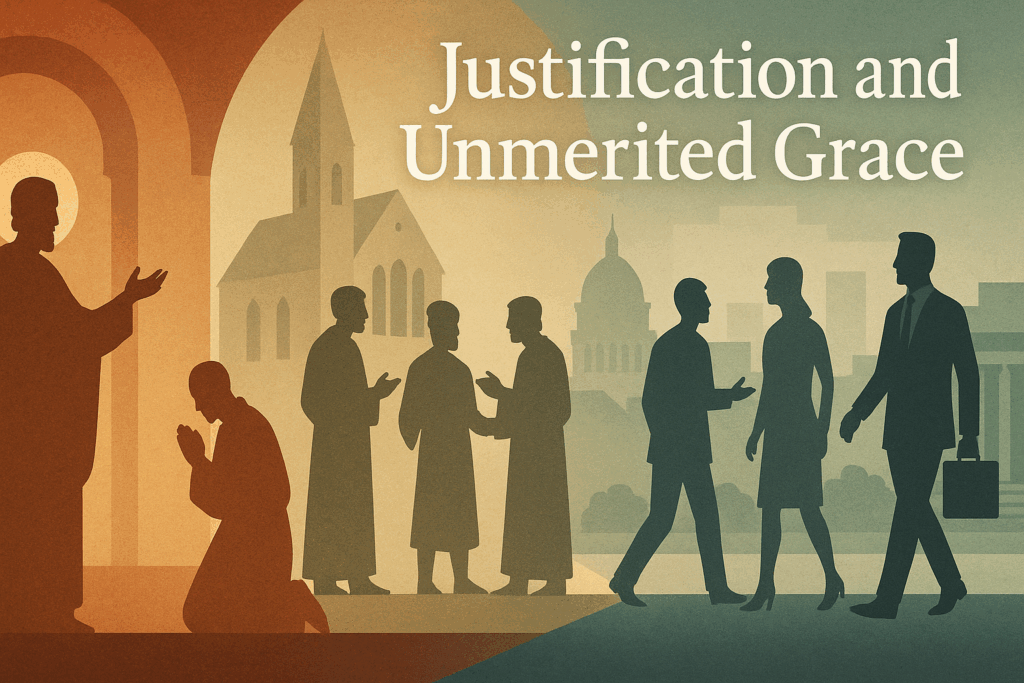At the center of Paul’s gospel stands the revolutionary idea of justification by grace through faith. Unlike systems of merit that reward effort, status, or pedigree, Paul’s vision proclaims that no human achievement can secure righteousness before God. Instead, salvation is the gift of divine grace, received by faith alone. This paradigm transformed religious life in antiquity and laid the groundwork for modern ethics of equality, humility, and universal dignity. By severing worth from merit, Paul introduced a radical principle that still undergirds the values of justice and human rights today.

The Scriptural Witness
Paul begins with a universal diagnosis in Romans 3:23–24: “For all have sinned, and come short of the glory of God; being justified freely by his grace through the redemption that is in Christ Jesus.” The playing field is leveled—every human being falls short, regardless of heritage or performance. Yet the gift of justification is given “freely.” In a world obsessed with honor, status, and achievement, Paul collapses all grounds of boasting. Righteousness is not earned but received, grounding human worth in grace rather than accomplishment.
In Romans 5:8, Paul deepens this vision: “But God commendeth his love toward us, in that, while we were yet sinners, Christ died for us.” Grace is not God’s reward for the deserving but God’s initiative toward the undeserving. The radical asymmetry here defines grace: God acts first, without condition. Human value rests not on moral record but on divine love. This insight would inspire later movements of reform, charity, and inclusion, all grounded in the conviction that worth is bestowed, not earned.
Paul makes the principle explicit in Ephesians 2:8–9: “For by grace are ye saved through faith; and that not of yourselves: it is the gift of God: not of works, lest any man should boast.” The very structure of human pride is dismantled. No one can claim superiority before God on the basis of works. Salvation as gift rather than achievement severs the link between worth and performance. In this, Paul provides a theological foundation for modern ideals of human equality: no one has greater claim to dignity than another, because all are equal recipients of grace.
The Pauline Paradigm and Modern Ethics
Paul’s teaching on justification by grace shattered ancient assumptions about merit and worth. In a world stratified by social class, citizenship, and moral achievement, Paul proclaimed that all are equally in need of grace and equally recipients of it through Christ. This radical leveling anticipated the modern conviction that every person possesses equal dignity, regardless of status, achievement, or ability.
The ethical consequences are profound. By dismantling systems of boasting, Paul undermined the hierarchies of pride that divide humanity. In their place, he introduced humility as the central virtue of human community. This humility would later inform Christian monasticism, charitable institutions, and the very idea of social welfare—that the weak and poor deserve care not because they have earned it, but because grace calls for it.
In the secular realm, the logic of grace has persisted in ideas of universal rights and justice. If worth is not tied to achievement, then every person has inherent dignity that the state must honor. Modern legal and political systems, with their emphasis on equality before the law, carry forward this Pauline conviction. Even the welfare state reflects Paul’s paradigm: assistance is not merely for the deserving poor but for all in need, because dignity is not based on merit.
Why It Matters Today
In an age obsessed with performance, achievement, and meritocracy, Paul’s paradigm remains profoundly countercultural. We measure worth by résumés, productivity, and social influence. Yet Paul insists that true worth comes not from human effort but from divine grace. This reminder protects society from idolizing success and marginalizing failure. It teaches us that dignity belongs as much to the least as to the greatest.
Moreover, modern secular ethics—whether in human rights, social equality, or humanitarian care—owe their foundations to Paul’s proclamation of grace. To forget this heritage is to risk reducing dignity to utility and equality to expediency. Paul’s paradigm of unmerited grace anchors our conviction that worth is inherent, not achieved.
The message of justification by grace through faith, then, is more than a theological doctrine. It is a civilizational cornerstone. It insists that no one can boast and no one is excluded, for all stand equally in need of grace and equally enriched by it. This truth continues to shape the modern world, calling us to humility, equality, and love.
